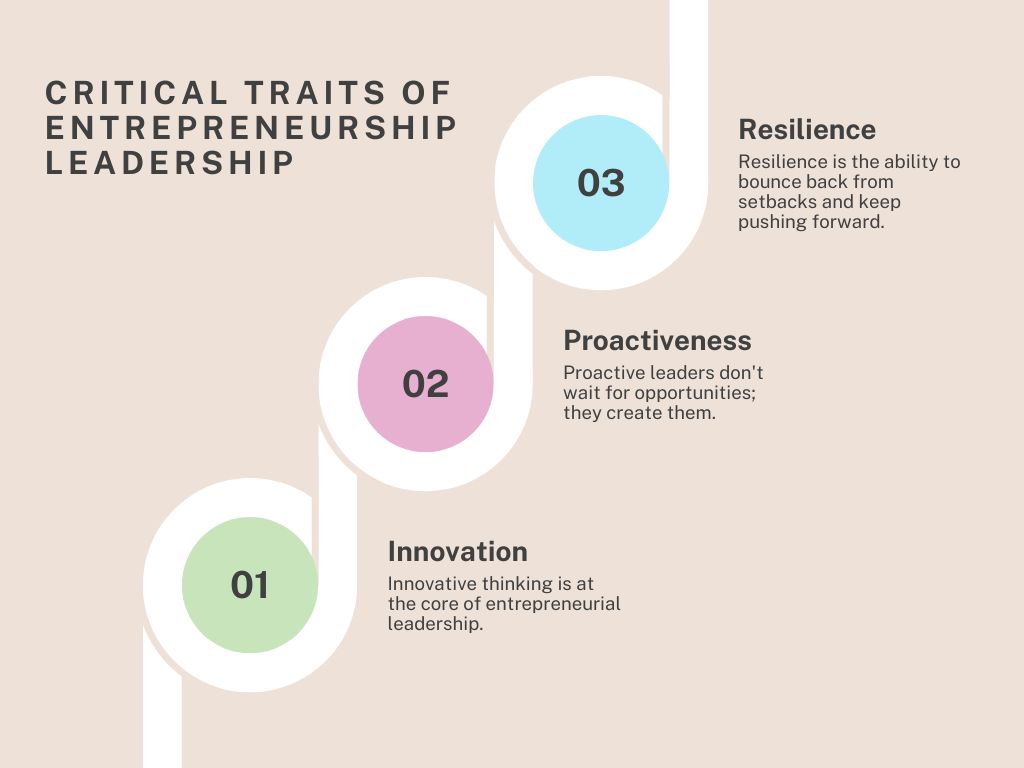Leadership in entrepreneurship goes beyond conventional management. It’s about sparking innovation, taking charge, and bouncing back from setbacks to steer your business toward success. This unique leadership style combines forward-thinking, initiative, and determination to excel in today’s dynamic business environment.
Entrepreneurial leaders don’t just direct teams. They ignite passion, guide visions, and create value while embracing change. They transform obstacles into stepping stones and inspire their teams to reach for the stars.
What is Entrepreneurship Leadership?
Entrepreneurship leadership embodies an innovative mindset. It’s about being proactive, resilient, and always looking for fresh opportunities. As an entrepreneurial leader, you’re not content with the status quo. Instead, you’re constantly seeking ways to improve, grow, and make a lasting impact.
This leadership approach is particularly relevant in our fast-paced, unpredictable business climate, where traditional leadership models often fall short. Entrepreneurial leaders build strong relationships, prioritize their team members, and maintain an unwavering optimism about what’s possible.

Critical Traits of Entrepreneurship Leadership
Let’s explore the key characteristics that define an entrepreneurial leader. Understanding these traits will help you identify and nurture them in your own leadership style.
Innovation
Innovative thinking is at the core of entrepreneurial leadership. It’s about constantly seeking creative solutions to problems and encouraging your team to do the same.
Take Steve Jobs, for example. He revolutionized the tech industry by developing groundbreaking products like the iPhone and iPad, fostering a culture at Apple where new ideas were highly prized.
But innovation isn’t limited to inventing new products. It also involves finding novel ways to streamline operations, enhance customer experiences, and improve processes. It’s about challenging the norm and asking, “How can we do this better?”
To cultivate innovation:
- Set aside time for brainstorming sessions
- Create a safe space for sharing unconventional ideas
- Reward creative thinking, even if the ideas don’t always pan out
- Encourage cross-departmental collaboration to spark new perspectives
Proactiveness
Proactive leaders don’t wait for opportunities; they create them. Elon Musk exemplifies this trait with his ambitious projects like Tesla and SpaceX. He actively pursues groundbreaking ideas, setting the pace for entire industries.
Being proactive means anticipating market trends, recognizing emerging opportunities, and taking decisive action. It’s about being a step ahead and leading the charge in your industry.
To enhance proactiveness:
- Regularly analyze market trends and consumer behavior
- Set ambitious goals and create detailed action plans to achieve them
- Encourage your team to bring potential opportunities to the table
- Be willing to take calculated risks and learn from the outcomes
Resilience
Resilience is the ability to bounce back from setbacks and keep pushing forward. Oprah Winfrey’s journey is a prime example. Despite facing numerous challenges, she built a media empire and became a globally influential figure. Her story shows how resilience can turn obstacles into opportunities for growth and success.
In leadership, resilience means maintaining a positive outlook, learning from mistakes, and consistently striving for improvement. It’s about viewing challenges as chances to grow stronger and wiser.
To build resilience:
- Develop a growth mindset that sees failures as learning experiences
- Practice stress-management techniques to stay calm under pressure
- Celebrate small wins to maintain motivation during tough times
- Share your own experiences of overcoming challenges with your team
How to Develop Entrepreneurship Leadership
Integrating entrepreneurial traits into your leadership style requires conscious effort and practice. Here are some practical steps to help you develop your entrepreneurship leadership skills:
Empower Your Team
Effective entrepreneurial leaders understand the importance of empowering their team members. This involves giving them the autonomy to make decisions, take ownership of projects, and contribute their unique perspectives to the organization’s goals.
Richard Branson, founder of the Virgin Group, is renowned for his ability to empower and motivate his employees. He believes in allowing his team members to take initiative and make decisions, fostering a sense of ownership and accountability throughout the organization.
To empower your team, start by clearly communicating your vision and expectations. Provide your team members with the resources and support they need to succeed, but avoid micromanaging their work. Encourage them to take calculated risks and learn from both successes and failures. Regularly seek their input on important decisions and acknowledge their contributions to the organization’s success.
Focus on Customers
Entrepreneurial leaders recognize that customer satisfaction is paramount to long-term success. They consistently strive to understand and exceed customer expectations, using feedback to drive continuous improvement in products and services.
Jeff Bezos built Amazon into a global powerhouse by maintaining an unwavering focus on customer experience. From the company’s early days, Bezos emphasized the importance of understanding customer needs and continuously improving the shopping experience. This customer-centric approach has been a key driver of Amazon’s growth and success.
To enhance your customer focus, implement regular feedback mechanisms to gather insights from your clients or users. Use this information to refine your offerings and improve your service delivery.
Also, encourage your team to think from the customer’s perspective when developing new products or processes. Consider creating cross-functional teams that bring together diverse perspectives to solve customer problems and enhance the overall experience.
Commit to Learning
Entrepreneurial leaders are lifelong learners who constantly seek new knowledge and insights to stay ahead in their industries. They understand that in a rapidly changing business environment, continuous learning is essential for maintaining a competitive edge.
Warren Buffett, one of the most successful investors in history, attributes much of his success to his commitment to ongoing learning. He dedicates a significant portion of his time to reading and staying informed about various industries and market trends, allowing him to make well-informed investment decisions.
To foster a culture of learning in your organization, lead by example. Set aside time for personal development and share what you learn with your team. Encourage your employees to pursue professional development opportunities and provide resources to support their growth.
In addition, create a knowledge-sharing platform where team members can exchange insights and best practices. By prioritizing learning, you’ll build a more adaptable and innovative organization.
Practical Steps to Enhance Your Leadership
To further develop your entrepreneurship leadership skills, consider implementing these actionable strategies:
Encourage Innovation
Foster a culture that embraces and experiments with fresh ideas. This might include organizing brainstorming meetings or establishing innovation hubs within your organization. Motivate your team to think outside the box and take measured risks.
We empower people to succeed through practical business information and essential services. If you’re looking for help with SEO, copywriting, or getting your online presence set up properly, you’re in the right place. If this piece helped, feel free to share it with someone who’d get value from it. Do you need help with something? Contact Us
Want a heads-up once a week whenever a new article drops?







